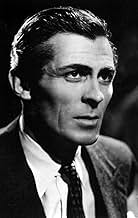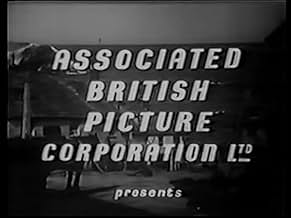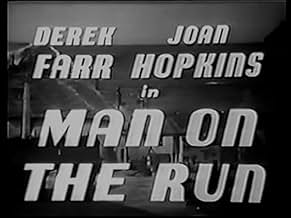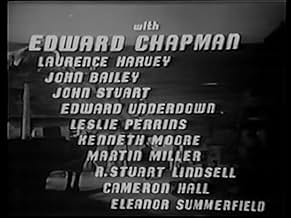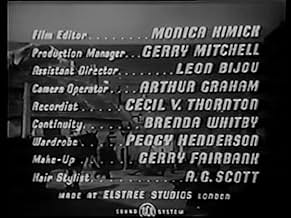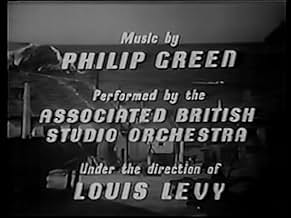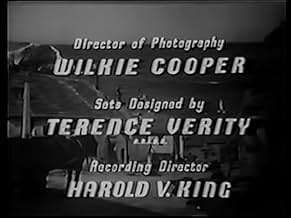Füge eine Handlung in deiner Sprache hinzuIn post-war Britain, an army deserter unwittingly gets involved in murder and armed robbery and enlists the aid of a war widow to help clear his name.In post-war Britain, an army deserter unwittingly gets involved in murder and armed robbery and enlists the aid of a war widow to help clear his name.In post-war Britain, an army deserter unwittingly gets involved in murder and armed robbery and enlists the aid of a war widow to help clear his name.
- Regie
- Drehbuch
- Hauptbesetzung
Howard Marion-Crawford
- 1st Paratrooper
- (as Howard Marion Crawford)
Kenneth More
- Corporal Newman
- (as Kenneth Moore)
Martin Miller
- Cafe Proprietor
- (as Martyn Miller)
Empfohlene Bewertungen
An astringent little drama painting a vivid picture as shot by Wilkie Cooper of a seething postwar London rife with deserters, blackmailers and other lowlifes.
Top-billed Joan Hopkins is rather stiff as the heroine, but this actually renders her more more rather than less appealing - not being conventional leading lady material - and as usual the supporting case is full of entertaining surprises, including early appearances by Kenneth More and a moustached Laurence Harvey in only his second film role as a detective.
Top-billed Joan Hopkins is rather stiff as the heroine, but this actually renders her more more rather than less appealing - not being conventional leading lady material - and as usual the supporting case is full of entertaining surprises, including early appearances by Kenneth More and a moustached Laurence Harvey in only his second film role as a detective.
The great shame of unused female actors in British cinema is far too long; Joan Greenwood was an example, and rarely given roles that were truly worthy of her. Joan Hopkins is another and even less well known than Greenwood or many others. A pity because she had a statuesque beauty, and a quiet charm and in some shots her beauty almost rivals Greta Garbo. Opposite Derek Farr there is good chemistry, and for once she is pivotal to the film and not only decoration. Farr is a deserter from WW2 and on the run not only for that, but for a murder he is suspected of committing. Hopkins takes him into her flat and the two fall in love. I liked too the atmosphere of the UK after the war, with its turmoil at getting back to a previous life that will never come again. A fluctuating chaos that lasted through the late 1940's and the mid to late 1950's. The film is rich on detail, and there is Kenneth More as a war veteran in a small but significant role. Well directed,, and in the main well acted, it is worthy of hunting down for all those interested in this period of history, and the run down houses peeling with damp and cold bear no resemblance to the wealth there today. These films are essential to UK history and the passing of times, and the poverty and wealth that goes with it. And Joan Hopkins is quite simply excellent.
This is the one and only movie I saw (and I saw many) tackling the theme of deserters. Main character Peter is one of them, a guy who used to be a good soldier but felt compelled to run AWOL after four years of war because his father died in a raid and his mother and sister needed his presence.
Peter is working as a bartender in a remote corner of England when an ex-comrade happens to pass by and tries to blackmail him. Peter moves to London, where life is difficult and expensive, and while trying to pawn his weapon he gets involved in an attempted robbery. He's only a witness but the police are chasing him.
Attractive widow Jean comes to his help and the plot develops nicely, albeit in a slightly forced way towards a suitable ending. The interesting part is the perspective of deserters, considered both from a negative and less negative point of view and just for that, the movie deserves some extra points.
Peter is working as a bartender in a remote corner of England when an ex-comrade happens to pass by and tries to blackmail him. Peter moves to London, where life is difficult and expensive, and while trying to pawn his weapon he gets involved in an attempted robbery. He's only a witness but the police are chasing him.
Attractive widow Jean comes to his help and the plot develops nicely, albeit in a slightly forced way towards a suitable ending. The interesting part is the perspective of deserters, considered both from a negative and less negative point of view and just for that, the movie deserves some extra points.
Peter Burden (Derek Farr) is an army deserter, one of twenty thousand British men who live in fear of imprisonment even after the war has ended. Having served four years, the authorities denied his request for compassionate leave in order to attend his mother's deathbed and he absconded in disgust. He is now working as a landlord of a country pub and is pulling pints when an old army acquaintance (Kenneth More) walks in and recognizes him. Corporal Newman is newly demobbed and, having found only low-paid work in the area, opportunistically blackmails Burden. Terrified, Burden flees again, this time returning to London, where a lack of funds and the late rent on a ragged bedsit force him to try and pawn his old service revolver. At the jeweller's, however, two armed robbers arrive and promptly kill a copper, with Burdon believed to be part of the gang.
His attempts to elude the police become more perilous than ever and a desperate escape sees him bounding breathlessly into the house of young widow Jean Adams (Joan Hopkins). Jean takes pity on the ex-soldier and agrees to help. The pair become determined to find the robbers, knowing only that one of them (Edward Underdown) is missing two fingers on his left hand. All the while, they must avoid the grimly persistent Chief Inspector Mitchell (Edward Chapman) and Detective Sergeant Lawson (a young Laurence Harvey), who prove to be quite able pursuers...
Lawrence Huntington directed, produced and wrote this foray into near-noir which was presumably inspired by the many deserters still at large long after V. E. Day. His script carefully positions Burdon as a sympathetic figure (the name is well-chosen).
The sad circumstances surrounding his desertion and the fact he had spent most of the war in combat is repeated at least once. To steer clear from presenting him as a coward or a chancer was undoubtedly important as everyone in the audience would have known soldiers or might even have been one themselves. Huntington also has his protagonist plea for a more constructive solution to the problem, particularly when so many such people inevitably turn to crime to survive. This situation, often forgotten today, makes Man on the Run interesting and slightly more nuanced than other chase thrillers, though it so solidly sides with Burdon that a more minute exploration of similar issues facing other such soldiers - for example, post-traumatic stress or the frustrating futility of war itself - is avoided altogether. There's a sense that each man would have his own story, though nobody describes what those might be.
Derek Farr is excellent as Burdon: pained, thoughtful, and reluctant to enlist anyone else's help. It's a shame he didn't have more of a career as he could easily have become a Kenneth More. More himself pops up early on, well before his middle-class every-man persona, like an English James Stewart in tweeds and a pipe, would lead him to become one of Britain's biggest film stars.
The police investigation, meanwhile, is headed by the sort of dogged, pipe-smoking detective familiar to pictures of this period, with Chapman's chief inspector wry and astute enough to elicit tension.
It's this quietly humming, will-they-catch-him? Element which carries the film, particularly in the excellent first half, though a thrilling set-piece of the sort included in The 39 Steps (which also had a bad guy deprived of a digit) or North By Northwest is unfortunately even more elusive than Burdon himself.
Particularly interesting for its glimpses of post-war life (from genuine London locations to a reference to radio's proto-James Bond Dick Barton), plus some gently amusing moments, Man on the Run makes for an entertaining and compelling thriller which is much recommended.
His attempts to elude the police become more perilous than ever and a desperate escape sees him bounding breathlessly into the house of young widow Jean Adams (Joan Hopkins). Jean takes pity on the ex-soldier and agrees to help. The pair become determined to find the robbers, knowing only that one of them (Edward Underdown) is missing two fingers on his left hand. All the while, they must avoid the grimly persistent Chief Inspector Mitchell (Edward Chapman) and Detective Sergeant Lawson (a young Laurence Harvey), who prove to be quite able pursuers...
Lawrence Huntington directed, produced and wrote this foray into near-noir which was presumably inspired by the many deserters still at large long after V. E. Day. His script carefully positions Burdon as a sympathetic figure (the name is well-chosen).
The sad circumstances surrounding his desertion and the fact he had spent most of the war in combat is repeated at least once. To steer clear from presenting him as a coward or a chancer was undoubtedly important as everyone in the audience would have known soldiers or might even have been one themselves. Huntington also has his protagonist plea for a more constructive solution to the problem, particularly when so many such people inevitably turn to crime to survive. This situation, often forgotten today, makes Man on the Run interesting and slightly more nuanced than other chase thrillers, though it so solidly sides with Burdon that a more minute exploration of similar issues facing other such soldiers - for example, post-traumatic stress or the frustrating futility of war itself - is avoided altogether. There's a sense that each man would have his own story, though nobody describes what those might be.
Derek Farr is excellent as Burdon: pained, thoughtful, and reluctant to enlist anyone else's help. It's a shame he didn't have more of a career as he could easily have become a Kenneth More. More himself pops up early on, well before his middle-class every-man persona, like an English James Stewart in tweeds and a pipe, would lead him to become one of Britain's biggest film stars.
The police investigation, meanwhile, is headed by the sort of dogged, pipe-smoking detective familiar to pictures of this period, with Chapman's chief inspector wry and astute enough to elicit tension.
It's this quietly humming, will-they-catch-him? Element which carries the film, particularly in the excellent first half, though a thrilling set-piece of the sort included in The 39 Steps (which also had a bad guy deprived of a digit) or North By Northwest is unfortunately even more elusive than Burdon himself.
Particularly interesting for its glimpses of post-war life (from genuine London locations to a reference to radio's proto-James Bond Dick Barton), plus some gently amusing moments, Man on the Run makes for an entertaining and compelling thriller which is much recommended.
Most enjoyable and fast moving film from Lawrence Huntington in an amazingly crisp and clear Blu-ray print. Not incredibly original story as the title may suggest but the twist here is the background of some 20,000 deserters in the UK desperately trying to evade capture and survive on the fringe of society. Wonderful location shooting on the edge of Soho, Seven Dials and Mayfair plus some unbelievably effective set design and not forgetting the village of Corfe Castle at the start. When we shift to Wapping the pub interior is so authentic I am trying to work out just which one it is but its all done in the studio, fantastic job. Performances are fine, some of us groan when we see Kenneth More at the start, in one of his earlier films, but he is only a bit part as is Alfie Bass who we see for about two seconds. It is Derek Farr and Joan Hopkins who play the leads, perfectly adequately and more to the point convincingly and fortunatley a young Laurence Harvey doesn't have too much to do. A great watch and makes one wonder how many other gems there might be of this period.
Wusstest du schon
- WissenswertesThe dialogue includes several clear uses of "basket" as a minced oath for "bastard". However the film was given an 'A' certificate (for "Adult Audiences") by the British Board of Film Censors, because of the depiction of an armed robbery.
- PatzerKenneth More is listed as Kenneth Moore in the opening credits but is listed correctly in the closing credits.
- Zitate
Sgt. Peter Burden, alias Brown: Well, do you believe any of this, or am I just wasting my time?
Top-Auswahl
Melde dich zum Bewerten an und greife auf die Watchlist für personalisierte Empfehlungen zu.
Details
- Erscheinungsdatum
- Herkunftsland
- Sprache
- Auch bekannt als
- Man on the Run
- Drehorte
- Produktionsfirma
- Weitere beteiligte Unternehmen bei IMDbPro anzeigen
- Laufzeit1 Stunde 22 Minuten
- Farbe
- Seitenverhältnis
- 1.37 : 1
Zu dieser Seite beitragen
Bearbeitung vorschlagen oder fehlenden Inhalt hinzufügen


